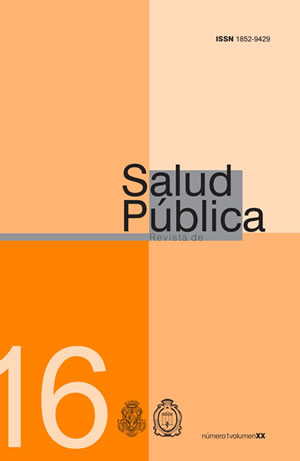CONTENTS IN THE HEALTH SECTION AND SPECIFIC COMPETENCES IN THE LEVELING COURSE IN THE SCHOOL OF MEDICINE
DOI:
https://doi.org/10.31052/1853.1180.v20.n1.13966Keywords:
health, medicine, leveling coursesAbstract
n order to achieve academic excellence in their future professionals, university institutions require the consideration of education with a fundamental meaning. This work identifi es the contents in the health section of the exercise material included in the Leveling Course and the specifi c competences in the different Main Topics, from the teachers ́perspective. An instrument including the following items: objectives, contents, activities and biography was applied to identify the contents in the health section. To inquire about the teachers’ perspective a questionnaire was used with eight key informants; it inc luded the assessment of specifi c competences in the area they are in charge of. As a conclusion, it is observed that it is important to articulate education and health, interms of linking teachers’ experience-training, students’ knowledge and specifi c contents regarding the process health-illness, since it becomes feedback for the Leveling Courses.Downloads
References
1- Silva, P. (2010) La universidad Latinoamericana en la época actual. Revista Cur-sos pre-congreso Universidad 2010. La Habana. Editorial Universitaria. 2010. 54 p.
2- Trucchia, S. (2013) Análisis de los factores asociados al rendimiento académico de los estudiantes de la Carrera de Medicina. Tesis Doctoral. Facultad de Ciencias Médicas UNC.
Revista de Salud Pública, (XX) 1:59-68 Abril 201668Contenidos en el área de salud / Lucchese M1, Burrone MS2, Novella M3, Romero D4, Oliveros M5, Fernández R6.
3- Ocaña Fernández Y. (2011) Variables académicas que infl uyen en el rendi-miento académico de los estudiantes universitarios. Invest. Educ. [Online]. vol.15, no.27 [citado 29/12/2013], p.165-179. En: http://sisbib.unmsm.edu.pe/BibVirtual/Publicaciones/Inv_Educativa/2011_n27/a11v15n27.pd
4- Garbanzo Vargas G. (2007) Calidad y equidad de la educación superior pú-blica. Aspectos por considerar en su interpretación. Rev. Educ. Univ Costa Rica. 31(2): 11-27.
5- Ezcurra A. (2010) Abandono estudiantil en educación superior. Hipótesis y conceptos. En Gluz N. (Edit.) Admisión a la universidad y selectividad social. Cuando la democratización es más que un problema de “ingresos” (pp. 23-62). Los Polvorines: Universidad Nacional de General Sarmiento.
6- Ezcurra A, Feeney S, Grandoli M, Marquina M, Pegasano E, Rosica M, Sosa S. Gluz N. (Edit.) (2011) Admisión a la Universidad y selectividad social. Cuando la democratización es más que un problema de “ingresos”. Editorial: Universidad Nacional de Gral. Sarmiento. Buenos Aires. 240 p.
7- Altbach P, Reisberg L, Rumbley L. (2009) Trends in global higher educa-tion: tracking an academic revolution. Paris: UNESCO. World Conference on Higher Education.
8- Díaz Peralta C. (2008) Modelo Conceptual para la Deserción Estudiantil Universitaria Chilena. Estud Pedagóg. 34 (2): 65-86.
9- Nutt D, Calderon D. (2009) The fi rst-year experience: an international pers-pective. Monografía N°52. Carolina del Sur: National Resource Center for the fi rst year experience and students in transition y teesside university.
10- Oliver C, Eimer G, Robert E, Bálsamo N y Crivello M. (2008) Ciclo de Nivelación Universitario. ¿Una necesidad? Departamento de Ingeniería Química. Facultad Córdoba. Universidad Tecnológica Nacional.
11- Cerioni L, Donnini N, Morresi S. (2010) X Coloquio Internacional Sobre Gestión Universitaria en América del Sur. Aplicación de indicadores cuali-cuantitativos para evaluar un programa de admisión a la educación supe-rior. Departamento de Economía Universidad Nacional del Sur. Mar del Plata
12- Venturelli J. (1997) Educación Médica: nuevos enfoques metas y métodos. Washington Dc. Organización Panamericana de la Salud.
13- Brailovsky C. (2001) Aportes para un cambio curricular en Argentina. Fa-cultad de Medicina- UBA. OPS. Buenos Aires.
14- Montenegro H y Fuentealba R (2010) El formador de futuros profesiona-les: una nueva forma de comprender la docencia. Calidad en la Educación. Nº32.
15- Schön, Donald (1992) La formación de profesionales refl exivos. Hacia un nuevo diseño de la enseñanza y el aprendizaje de las profesiones. Barce-lona: Paidós.
16- Shulman, Lee (2000) From Minsk to Pinsk: Why A Scholarship of Tea-ching and Learning? Journal of the Scholarship of Teaching and Learning, 1(1), pp. 48-43.
17- Litwin, E. (1996) El campo de la Didáctica: la búsqueda de una nueva agenda. En Camilloni,A. et al. Corrientes didácticas Contemporáneas. Bue-nos Aires: Paidós.
18- Delgado de Colmenares, F. (2008) Retos actuales de la investigación edu-cativa. Actualidades Investigativas en Educación Revista electrónica, vol. 8, n3: pp. 1-18.
19- Gómez Mendoza, MA. (2000) análisis de contenido cualitativo y cuantita-tivo: defi nición, clasifi cación y metodología. Revista de Ciencias Humanas. Colombia.
Downloads
Published
Issue
Section
License
Copyright (c) 2016 Escuela de Salud Pública y Ambiente. Facultad de Ciencias Médicas. Universidad Nacional de Córdoba

This work is licensed under a Creative Commons Attribution-NonCommercial 4.0 International License.
Authors who publish with this journal agree to the following terms:
- Authors retain copyright and grant the journal right of first publication with the work simultaneously licensed under a Creative Commons Attribution License which allows the work to be copied, distributed, exhibited and interpreted as long as it is not done for commercial purposes.
- Authors are able to enter into separate, additional contractual arrangements for the non-exclusive distribution of the journal's published version of the work (e.g., post it to an institutional repository or publish it in a book), with an acknowledgement of its initial publication in this journal.
- Authors are permitted and encouraged to post their work online (e.g., in institutional repositories or on their website) after the publication process. (See The Effect of Open Access). (See The Effect of Open Access).







